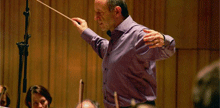The orchestra’s success is surely, in large part, due to their long relationship with conductor and co-founder Iván Fischer. It is clear that they view each performance and recording as a special occasion, and so it was to be at this concert featuring two great masterpieces from the 19th and 20th centuries.
The concert opened with Bartók’s enduringly popular Concerto for Orchestra. Beginning with a low growl from the basses, here ranged along the back of the stage where their omnipresence was assured, the piece unfolds mysteriously with Bartók’s characteristic folk-influenced melodies introduced gradually. The violins, divided left and right across the front of the stage, then demonstrated their mettle by tearing into their first entry. It was soon clear that the Budapest string sound was ultra-refined, with substantial heft ready to employ when required.
Fischer took all the movements without pauses between, making the work feel much more like a coherent whole than I have considered it previously. Furthermore, his fluid beat and the refined playing gave this angular work many more smooth edges than I am used to hearing in it. The second movement, “Play of the Couples”, ushered in by the tapping of a snare-less side drum, could not have been much more playful. The bassoon couple, in particular, had riotous fun with their parts, raising more than a few smiles in both the orchestra and audience.
These players wore their virtuosity lightly. This was most evident in the famously vulgar Shostakovich “Leningrad” Symphony quotation (which may have nothing to do with that piece, of course) in the fourth movement. Except here it was played without forced vulgarity, more knowingly tongue-in-cheek, with Fischer almost dancing along to the gaudy tune.
The frantic fugal writing in the whirling finale was easily discernible by virtue of the levity in the string playing as well as their enlightened seating arrangement. By the time we reached the headlong rush to the coda, it was obvious that Fischer had meticulously prepared and paced all the preceding sections expertly. I doubt I will hear a more colourful, more finely judged and performed rendition of this piece for some time.
The Hungarians were on home territory with the Bartók, but how would they fare in German core repertoire? Masterfully, as it turned out. Brahms’ flowing lines flowed as they should and the miraculous opening phrase was somehow perfectly teased into existence out of the ether by Fischer. As I am sure was intended by the composer, barlines were almost imperceptible. That I did not find myself considering the tempi throughout this performance suggests that Fischer found precisely the right ones. He did not opt for a unifying tempo for a complete movement in the manner of, say, Haitink, but rather found ideal tempi for each section and somehow made every subsequent one seem inevitable. One unexpected moment at the coda of the first movement found Fischer almost silencing the horns at a moment when flashier conductors often let them off their leashes, allowing a wealth of woodwind detail to emerge.
Further highlights of this superb performance included the impossibly unanimous string pizzicato chords that intoned the heavenly tread of the Andante moderato, not to mention the heartfelt cello melody and touch of vibrato in the mellow horn section. There were occasional mannerisms but these were not disruptive: the slight pause in the opening phrase of the otherwise deftly played scherzo, the triangle player immersed cleverly in amidst the cellos and violas and the desolate flute soliloquy in the finale, here broadened in tempo further than most conductors would dare. The apocalypse in the passacaglia finale, when it arrived, hit home as it should but the coda was played more as a measured grim arrival rather than a hurtling descent into the abyss.
Concerts like this make a reviewer’s job rather difficult as the superlatives begin to run out. With the sad passing of Sir Colin Davis in recent weeks, perhaps Fischer and his orchestra are the finest conductor/orchestra partnership around. The rest of the audience would perhaps agree and we were treated to a melancholic Hungarian Dance (number eleven) as an encore. Then, unexpectedly, Fischer changed seats with a first violinist, who summoned the CBSO’s Hungarian co-principal violist, Adam Romer, from his seat in the audience to join an impromptu gyspy folk band in some further musical delights.
by Peter Marks


